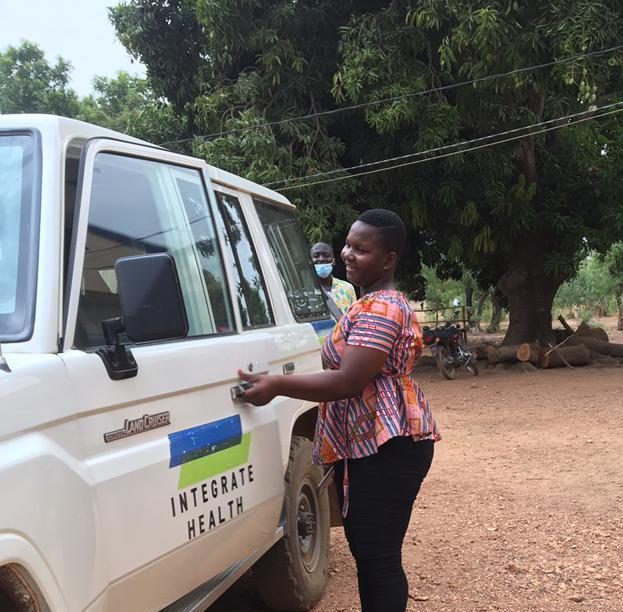Pawia Blandine Bokonam, always dreamed of becoming a chauffeur. Although she only ever saw men doing the job, she persevered. After obtaining her driver’s license in 2016 and completing her auto technician training the following year, Blandine went to work as an intern in an automotive mechanic and repair shop. After her internship, she worked as a professional driver for Plan International, before starting with Integrate Health in November 2020. At 26 years old, Blandine has made it clear that she is not afraid of taking on any position no matter the social biases.

Integrate Health is committed to hiring women at all levels of the health system, especially in roles where they are traditionally underrepresented. To date, the majority of IH staff, including more than 90% of community health workers, are women. While supporting the Togolese Ministry of Health to make primary healthcare accessible to all, IH is committed to ensuring that women, at every level, have a seat at the table.
Integrate Health is committed to hiring women at all levels of the health system, especially in roles where they are traditionally underrepresented. To date, the majority of IH staff, including more than 90% of community health workers, are women. While supporting the Togolese Ministry of Health to make primary healthcare accessible to all, IH is committed to ensuring that women, at every level, have a seat at the table.

In Togo, chauffeurs are predominantly men, a social norm that has persisted for decades. Fortunately, we are witnessing a slow but significant change lately thanks to Togolese women who are seizing opportunities to challenge this detrimental social norm. For Blandine, integrating into a team of male chauffeurs as a woman was something she grew accustomed to since obtaining her auto technician’s diploma. She has always been the only woman surrounded by men in the workplace, but believes that she acquired the ability to adapt easily to any environment because of her qualifications and experience. “My experience allows me to consider myself equal to the men that I work with and it gives me strength to set goals so that I can reach as far as I want,” says Blandine.
Blandine’s role is essential to IH. Each day, Blandine travels to IH-supported sites to bring supplies to health care providers. When Blandine arrives at the office at 7 a.m., she begins by cleaning the car and making sure everything is functional for the four to five hours she will be on the road. Some days, she packs up the office’s medications and medical supplies and heads out to the sites. Other days, she has to drive the program staff to wherever they need to go for their daily mission, including trainings and meetings outside the office. Dedicated chauffeurs like Blandine ensure that IH-supported clinics and community health workers have the supplies they need to care for their patients on time.
“It is not easy to drive on rural roads, but I can handle it, because I know IH’s mission which is to make quality primary healthcare accessible to all and I believe I am part of its achievement” she says. Blandine loves her job not only because of her contribution to saving many Togolese women and children’s lives, but also, because of the precious moments she shares with community members and her colleagues.
Blandine encourages other young women to be courageous in pursuing job opportunities in fields that are male dominated. “Everyone deserves the chance to do what they like,” she added. Blandine’s goal is to open her own automobile mechanic workshop and continue driving for organizations that work hard to save lives.

